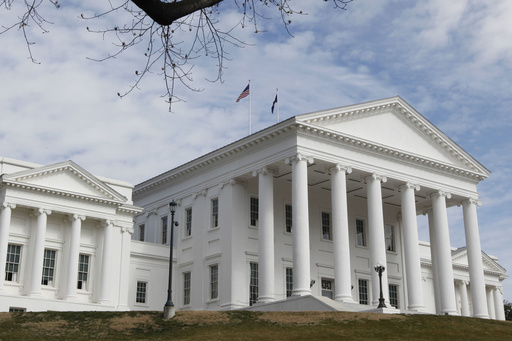
RICHMOND, Va. — This week, the Democratic-majority Virginia legislature introduced a series of bills that were previously vetoed by Republican Governor Glenn Youngkin as part of their ongoing effort to win his approval in the midst of the current legislative session.
Discussions in the House of Delegates and the Senate spanned various topics, including voter access and contraception, as lawmakers approached the critical “crossover” deadline. This is the point in the session by which all non-budget-related bills must be passed by their originating chambers.
Many of the proposals being pushed by Democrats mirror the extensive assortment of bills that Governor Youngkin vetoed last spring. Speaker Don Scott expressed confidence that Youngkin would likely reject scores of these new bills too, stating, “The governor had a record number of vetoes last time. And I’m sure he’ll do a lot of vetoing this time because, you know, he’s out of touch with the majority of Virginians.”
Democrats utilized their majorities in the legislature to push forward legislation aimed at eliminating a tax exemption for the Daughters of the Confederacy, tightening firearm regulations, and regulating marijuana sales. They successfully countered Republican efforts to lower taxes on tips, a key initiative of Youngkin’s.
Republican House Minority Leader Todd Gilbert acknowledged the Democrats’ good intentions but criticized their legislative agenda as inconsequential, given that most of it seems poised for veto by the governor. “They know that these are just posturing exercises on their part,” he stated.
The legislative session is set to conclude on February 22, coinciding with the upcoming elections in November that will see all House members, as well as the governor, lieutenant governor, and attorney general, on the ballot. Meanwhile, Governor Youngkin, who has been gaining national recognition, aims to make a significant impact during his remaining time in office.
Key proposals that progressed before the crossover date include:
**Maternal Health Initiatives**
Legislators approved a comprehensive package addressing maternal health disparities, with the aim of improving health outcomes for parents of color. Senator Lashresce Aird sponsored legislation that unanimously passed the Senate, allowing doulas to assist pregnant women during labor—a practice linked to better health outcomes. Additionally, Democratic Delegate Adele McClure’s bipartisan bill facilitating increased postpartum doula visits for Medicaid recipients also passed with a significant majority. Aird promoted a corresponding bill in the Senate to bolster these efforts.
Further, both chambers saw the passage of two bills establishing a Women’s Health Commission tasked with examining and suggesting improvements regarding women’s and maternal health issues. Legislation was also approved mandating the creation of a mobile app by the Department of Health for pregnant and postpartum individuals.
**Data Center Oversight**
Debates in both chambers surrounding the regulation of data centers’ energy consumption fell short of yielding passed legislation aimed at enhancing energy efficiency and transparency within these facilities. However, the Senate did approve a bill directing state utility regulators to investigate if the costs of energy consumption by data centers are unfairly transferred to consumers. The House also approved a measure that requires data centers to provide an assessment of their site’s impacts on various environmental and community factors.
**Labor Legislation**
House Democrats pushed forward a proposal aimed at raising the minimum wage from $12 an hour to $13.50 next year, and subsequently to $15 the following year—an initiative akin to a prior measure rejected by Youngkin. Additionally, legislators introduced a bill ensuring minimum wage rights for farm workers, which was also previously vetoed.
Efforts by Republicans to embed right-to-work protections into the state constitution, which would prevent unions from mandating membership, were also resisted by Democrats. Legislation to repeal a prohibition restricting public employees from collective bargaining was advanced as well, following an earlier law that expanded such rights to local government workers.
**Campaign Finance Regulations**
Lawmakers in the House and Senate came together to pass measures prohibiting the use of campaign funds for personal expenditures—a move prompted by Virginia being one of the few states lacking such a ban. However, two proposals that would have banned corporate contributions and limited personal donations were allowed to lapse without a vote in the Senate.
**Casino Proposal in Northern Virginia**
In a lively debate, the Senate voted 24-16 in favor of a bill that calls for a public referendum on a casino in a high-income suburb near Washington, D.C. Presented by Senate Majority Leader Scott Surovell, the bill aims to utilize future tax revenue generated by a potential casino to support local projects. Despite this, some Democrats from populous Washington suburbs remained staunchly opposed. They raised concerns about the societal implications of legalized gambling, stressing the potential for serious addiction issues and the lack of widespread community support for such an enterprise. The bill now heads to the House for consideration.

